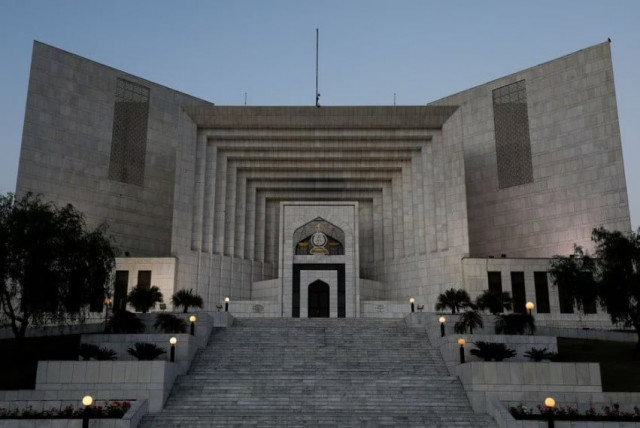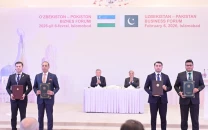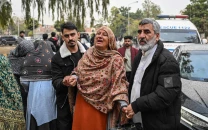Fate of reserved seats faces legal maze
PTI considering to take the matter to high court

The allocation of reserved seats to the Sunni Ittehad Council (SIC), now the refuge of the beleaguered PTI, encounters another legal hurdle, pushing the final decision into the hands of the superior courts once again.
The Election Commission of Pakistan (ECP), in a 4-1 majority verdict, dashed the SIC's hopes for a seat quota, citing "non-curable legal defects" and a violation of mandatory provisions in submitting party lists for reserved seats.
However, undeterred by the setback, PTI's legal minds are contemplating a high-stakes move to challenge the electoral body's decision in the high court.
A seasoned lawyer, privy to initial consultations, revealed plans to request a stay on the allocation of reserved seats to other political parties until the high court delivers its final verdict.
He said that while the possibility of approaching the Islamabad High Court was on the table, doubts linger about the Supreme Court's objections to territorial jurisdiction over approaching the Peshawar High Court, which is otherwise “ideally the best choice”.
Meanwhile, one of the key members of PTI's legal team, conceded that the party made a mistake by urging MNAs to join SIC. Notably, SIC did not provide a party ticket to any candidate, including its head, who contested the elections as an independent candidate.However, an internal dissent within PTI surfaced, with a faction opposing the alliance with Majlis Wahdat-e-Muslimeen. “Otherwise, that was a better option.”
Senior lawyers believe that PTI should have approached the ECP for the allocation of reserved seats without asking their MNAs to join any other party.
Veteran legal minds argue that PTI should have pursued ECP for reserved seat allocation without affiliating its MNAs with another party.
If the ECP rejected their plea, they could have escalated the matter to the Supreme Court, which previously declared PTI's intra-party election illegal. Apprehensions about seat deprivation were voiced by PTI's counsel before the bench led by Chief Justice Qazi Faez Isa.
As the legal battle unfolds, PTI contemplates challenging the ECP decision in the Islamabad High Court, with the composition of the bench looming as a crucial factor.
PTI founding chairman Imran Khan has already expressed reservations about Chief Justice Aamer Farooq.
It is pertinent to note that the January 13 order came with profound consequences, as the SC declared PTI's intra-party elections illegal, leading to the deprivation of the party's election symbol.
In the wake of its decision, severe criticism has been directed at the Supreme Court’s judgement. Some lawyers believe that the SC now has a golden opportunity to rectify the error by ensuring the allocation of reserved seats aligns with the PTI mandate.
Notably, during Chief Justice Qazi Faez Isa's tenure, no major decision by the ECP has been overturned by the SC as there exists a cordial relationship among institutions, and the superior bars are lending support to both the new government and CJP Isa.
Political observers have voiced concerns, noting that decisions in political matters often hinge on factors beyond legal considerations, with various other elements playing a crucial role. Ongoing discussions suggest that the ECP’s decision may contribute to further undermining democracy in the country.
Advocate Hafiz Ahsaan Ahmad Khokhar stated that the recent judgment by the ECP on the allocation and distribution of reserved seats for women and non-Muslims, based on the application of SIC, aligns with the legal framework outlined in Articles 5, 106, and 224 of the 1973 Constitution, as well as Section 104 of the Election Act 2017.
The decision is also in accordance with Rules 92, 93, and 94 of the Election Rules 2017, declaring SIC ineligible for the allocation of remaining reserved seats, with the only exception explicitly mentioned in the judgment.
According to the legal expert, the ECP cannot allocate the remaining reserved seats to any other political party. Therefore, to this extent, the recent judgment is not legally sustainable as per Article 51 of the Constitution.
This aspect has also been appropriately dissented by one member of the ECP. The legal expert contended that these remaining reserved seats for women and non-Muslims will remain vacant.
According to the legal expert, the ECP cannot allot these remaining reserved seats to any other political party, thus to this extent the instant judgment is not legally sustainable as per Article 51 of the Constitution, and this point has also been rightly dissented by one member of the Election Commission, and according to the legal expert, these remains reserved seats for women and non-Muslims will remain vacant.Meanwhile, Hafiz Ahsaan stated that the ECP dismissed the case brought by the SIC due to its legal and constitutional weaknesses. The case failed to meet the requirements of the Election Act and did not provide justification for the allocation of reserved seats for women and non-Muslims.
As a result, the SIC could not have legally justified its use of the Election Act and the Constitution as a means of obtaining a favourable ruling by circumventing these laws.
"As a result of the fact that this is the first time that a sizable number of candidates for the national assembly and provincial assemblies have been elected again in a general election and have joined a political party in both assemblies without having a parliamentary majority prior to running as independent candidates,” he added.
Hafiz Ahsaan has finally come to the conclusion that the 1973 Constitution's Articles 5, 106, and 224, Section 104 of the Election Act of 2017, and Rules 92, 93, and 94 of the Election Rules 2017 will all be eventually interpreted by higher courts in the resolution of this legal dispute"
Former additional attorney general Tariq Mahmood Khokhar has noted that democracy is under assault through “judicial and quasi-judicial processes.”
"In my opinion, the ECP’s decision of March 4 on reserved seats appears to be the direct and immediate outcome of the supreme court’s decision of January 13 on PTI’s election symbol. And they are not working alone. It is hard to make sense of a mere ordinary legislative instrument (The Election Act, 2017) overriding the constitutional and democratic fundamentals.”“Our nascent democracy dies under a shadow. It is a shadow that will endure, with judicial indiscretions on the record,” Khokhar said.


















COMMENTS
Comments are moderated and generally will be posted if they are on-topic and not abusive.
For more information, please see our Comments FAQ